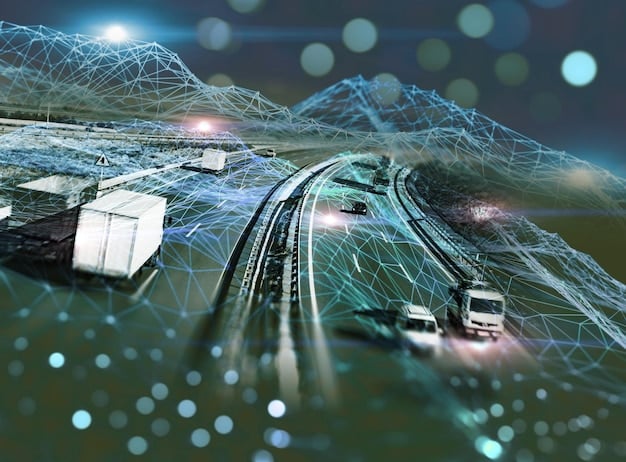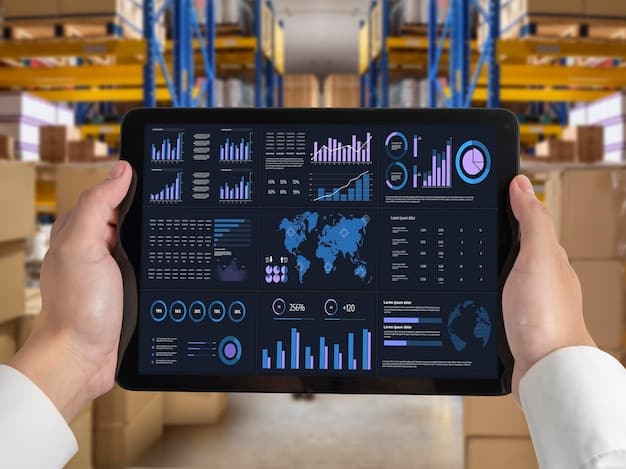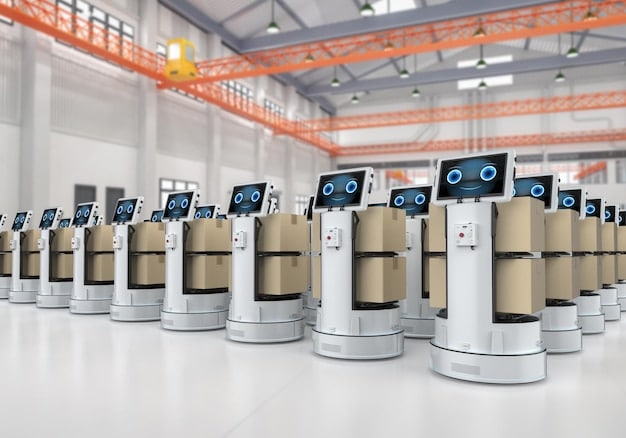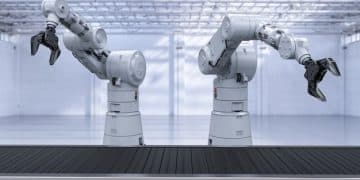AI-Optimized Supply Chains: Boosting Retail Efficiency & Cutting Costs

AI-Optimized Supply Chains: How AI is Improving Logistics and Reducing Shipping Costs by 15% for US Retailers is transforming the retail landscape by leveraging machine learning and data analytics to streamline operations, predict demand, and optimize delivery routes, leading to significant cost reductions and enhanced customer satisfaction.
The retail industry is undergoing a massive transformation, and at the forefront of this revolution are AI-Optimized Supply Chains: How AI is Improving Logistics and Reducing Shipping Costs by 15% for US Retailers. This shift is fundamentally changing how goods are moved and managed, from the factory floor to the customer’s doorstep.
Understanding AI’s Role in modern supply chains
Artificial intelligence (AI) is no longer a futuristic concept; it’s a present-day reality reshaping various industries, including supply chain management. AI’s ability to process vast amounts of data, identify patterns, and make predictions is revolutionizing how businesses operate.
What is AI in Supply Chain Management?
AI in supply chain management refers to the use of artificial intelligence technologies to optimize and automate various processes within the supply chain, enhancing efficiency and reducing operational costs.
Key AI Technologies Used
Several AI technologies are instrumental in optimizing supply chains including machine learning, natural language processing, and computer vision.
- Machine Learning: Utilized for predictive analytics, demand forecasting, and optimizing inventory levels.
- Natural Language Processing (NLP): Enables better communication and data extraction from textual data, such as customer reviews and feedback.
- Computer Vision: Aids in warehouse automation, quality control, and monitoring logistics operations through image and video analysis.

The integration of AI technologies is empowering businesses to make smarter, data-driven decisions, ultimately leading to more efficient and resilient supply chain operations.
The benefits of AI-powered logistics
The integration of AI into logistics offers numerous benefits, fundamentally transforming how goods are transported, tracked, and managed. These advancements are not only improving efficiency but also reducing costs and enhancing customer satisfaction.
Improved Efficiency
AI optimizes delivery routes, manages warehouse operations, and facilitates real-time tracking, leading to significantly improved operational efficiency.
Reduced Shipping Costs
By optimizing routes, predicting potential delays, and automating tasks, AI helps reduce fuel consumption, labor costs, and other shipping-related expenses.
- Predictive Maintenance: AI algorithms can predict when vehicles or equipment require maintenance, reducing downtime and repair costs.
- Automated Route Optimization: AI analyzes various factors such as traffic, weather, and delivery schedules to determine the most efficient routes.
- Demand Forecasting: AI predicts future demand, allowing for better inventory management and reducing the risk of overstocking or stockouts.
With AI-enhanced logistics, companies can achieve greater agility and responsiveness, enabling them to adapt quickly to changing market conditions and customer demands.
Case studies: retailers cutting costs with AI
Several US retailers have successfully implemented AI solutions in their supply chains, achieving significant cost reductions and operational improvements. These case studies highlight the tangible benefits of AI-powered logistics.
Walmart’s AI-Driven Supply Chain
Walmart has invested heavily in AI to optimize its supply chain, resulting in substantial cost savings and improved delivery times.
Amazon’s Predictive Shipping
Amazon uses AI to predict customer demand and optimize inventory placement, reducing shipping costs and improving delivery speed.

These examples demonstrate the transformative potential of AI in retail supply chains, showcasing how companies can leverage AI to gain a competitive edge and meet the evolving needs of their customers.
challenges of Implementing AI in supply chains
While the benefits of AI in supply chains are compelling, implementing these technologies is not without its challenges. Companies need to navigate various obstacles to successfully integrate AI into their existing operations.
Data Quality and Availability
AI algorithms require high-quality data to function effectively; poor or incomplete data can lead to inaccurate predictions and suboptimal decisions.
Integration with Existing Systems
Integrating AI systems with legacy IT infrastructure can be complex and costly, requiring careful planning and execution.
To overcome these challenges, companies must invest in data governance initiatives, prioritize system interoperability, and provide ongoing training and support to their employees.
The Future of AI in retail Supply Chains
The future of AI in retail supply chains is poised for continued growth and innovation, with new technologies and applications emerging that promise to further enhance efficiency and reduce costs.
Emerging Technologies
Expect to see more advancements in areas such as autonomous vehicles, prescriptive analytics, and blockchain integration, further transforming supply chain operations.
Sustainability Initiatives
AI will play an increasingly important role in promoting sustainability by optimizing routes, reducing waste, and improving energy efficiency.
- Autonomous Delivery Vehicles: Self-driving trucks and drones will streamline last-mile delivery, reducing labor costs and improving delivery times.
- Prescriptive Analytics: AI will not only predict future outcomes but also recommend specific actions to optimize performance and mitigate risks.
- Blockchain Integration: Blockchain technology will enhance transparency and security in supply chain transactions, reducing fraud and improving traceability.
As AI technologies continue to evolve, retailers that embrace these innovations will be better positioned to thrive in an increasingly competitive market.
Getting Started with AI in your supply chain
For US retailers looking to adopt AI in their supply chains, it’s essential to start with a well-defined strategy and a clear understanding of their business objectives. A phased approach can help manage the complexity and minimize risks.
Identify Key Areas for Improvement
Assess current supply chain operations to identify specific areas where AI can have the greatest impact, such as demand forecasting, route optimization, or warehouse management.
Pilot Projects
Start with small-scale pilot projects to test and validate AI solutions before rolling them out across the entire organization.
By taking a strategic and incremental approach, retailers can successfully integrate AI into their supply chains, realizing significant benefits in terms of cost savings, efficiency gains, and customer satisfaction.
| Key Point | Brief Description |
|---|---|
| 🤖 AI Integration | Implementing AI enhances supply chain efficiency and reduces costs. |
| 🚚 Logistics Benefits | AI-driven logistics optimize routes and minimize shipping expenses. |
| 📊 Predictive Analytics | AI predicts demand, improving inventory management and reducing waste. |
| 🌱 Sustainability | AI supports eco-friendly practices by optimizing resource use. |
Frequently Asked Questions
▼
AI enhances efficiency through predictive analytics, optimized routing, and automated processes, such as inventory management and demand forecasting, leading to faster delivery times.
▼
Common AI technologies include machine learning for predictions, NLP for analyzing text data, and computer vision to automate warehouse operations and logistics monitoring.
▼
Yes, AI optimizes delivery routes, predicts delays, and automates tasks, which reduces fuel consumption and labor costs, leading to significant savings in shipping expenses.
▼
Key challenges include ensuring data quality, integrating AI with existing IT systems, and managing the initial costs and complexity of adopting new AI technologies and algorithms.
▼
Retailers can start by identifying areas for improvement, initiating pilot projects to test AI solutions, and focusing on incremental integration to reduce risks and complexity in overall implementation.
Conclusion
The integration of AI into supply chains presents US retailers with a significant opportunity to enhance efficiency, reduce costs, and improve customer satisfaction. While there are challenges to overcome, the benefits of AI-powered logistics make it a crucial investment for businesses looking to stay competitive in the modern market.





